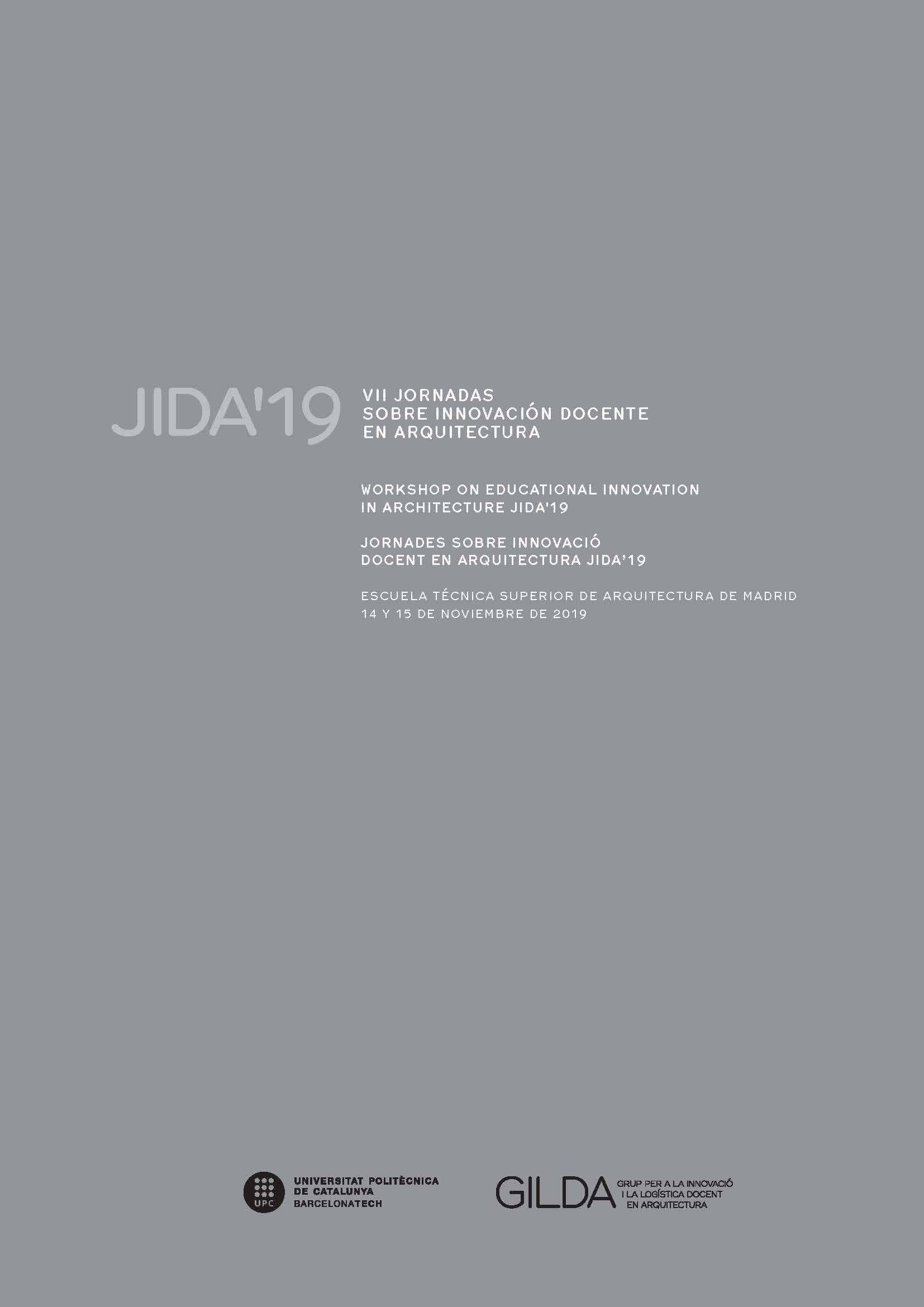Métodos docentes en la Era Digital: sistemas de respuesta inmediata en clase de urbanismo
DOI:
https://doi.org/10.5821/jida.2019.8310Resumen
Durante un cuatrimestre, cada lección magistral de urbanismo de primero de Arquitectura se sustituyó por un test sobre una lectura seleccionada en la que los alumnos podían trabajar durante las dos semanas anteriores fuera del aula. Los test los realizaba cada alumno individualmente usando un sistema de respuesta inmediata, pero poniendo en común las respuestas y fomentando el debate sobre temas y conceptos extraídos del texto y otros relacionados. La opinión de los estudiante se recogió a final de curso mediante una encuesta. Los resultados muestran que el alumnado considera que el método resulta más atractivo y eficaz que las lecciones magistrales y la mera lectura individual de textos, y corroboran las bondades de los SRI sugeridas en experiencias anteriores: es fácil de utilizar, aumenta la motivación y la atención, mejora la asimilación de conceptos y el rendimiento académico, promueve la reflexión y dinamiza el proceso de aprendizaje activando al alumno.
Citas
AWEDH, M., MUEEN, A., ZAFAR, B. y MANZOOR, U. (2014). Using Socrative and Smartphones for the support of collaborative learning. International Journal on Integrating Technology in Education, 3(4), 17-24.
BADIA, J. D., OLMO, F. y NAVARRO, J. M. (2016). On-Line Quizzes to Evaluate Comprehension and Integration Skills. Journal of Technology and Science Education, 6(2), 75-90.
BARRAGUÉS, J. I. y MORAIS, A. (2012). Una propuesta de uso de un Classroom Response System (CRS) para promover clases interactivas de Cálculo en la universidad. VII Congreso Internacional de Docencia Universitaria e Innovación. CIDUI.
BELLO, A. y MERINO, J. (2017). Socrative: A tool to dinamyze the classroom. WPOM-Working Papers on Operations Management, 8(0), 72.
BENÃTEZ-PORRES, J. (2015). Socrative como herramienta para la integración de contenidos en la asignatura ‘Didáctica de los Deportes’. XII Jornadas Internacionales de Innovación Universitaria. (pp. 824-831). Madrid.
BIGGS, J. y TANG, C. (2011). Teaching for Quality Learning at University (4th edition). New York: McGraw-Hill.
BLASCO-SERRANO, A. C., LACRUZ, J. L. y SARSA, J. (2018). Percepción de los estudiantes al ‘invertir la clase’ mediante el uso de redes sociales y sistemas de respuesta inmediata. RED. Revista de Educación a Distancia, 57(6), 1-19.
BLIGHT, D. A. (1972). What’s the Use of Lectures? Harmondsworth: Penguin.
CALDWELL, J. E. (2007). Clickers in the Large Classroom: Current Research and Best-Practice Tips. CBE Life Sciences Education, 6(1), 9-20.
CARDONA, F. y ATARÉS-HUERTA, L. (2019). Ludificación (gamification) y exámenes on-line como elemento dinamizador y motivador del estudio. In INNODOCT 2018 (pp. 625-638). Valencia: Editorial Universidad Politécnica de Valencia.
DERVAN, P. (2014). Increasing in-class student engagement using Socrative (an online student response system): a report. AISHE-J: The All Ireland Journal of Teaching and Learning in Higher Education, 6(3), 1801-1813.
EXCEL 2016, Microsoft (2010). Redmond, WA: Microsoft (One Microsoft Way, Redmond, WA 98052 USA)
FERNÃNDEZ, J., IBARZ, A., TORRELLA, J. R., URIZAR, G., BLASCO, J., VISCOR, G. y PAGES, T. (2012). Uso de sistemas de respuesta inmediata (clickers) para evaluar las prácticas de laboratorio: mejora del aprendizaje de los alumnos y de la enseñanza de los profesores. VII Congreso Internacional de Docencia Universitaria e Innovación. CIDUI.
IMAZEKI, J. (2014). Bring-Your-Own-Device: Turning Cell Phones into Forces for Good. The Journal of Economic Education, 45(3), 240-250.
LUESMA, M. J., SOTERAS, F. y ABADÃA, A. R. (2016). Valoración de la utilización de SOCRATIVE como herramienta didáctica interactiva en dos asignaturas del grado en Óptica-OptometrÃa de la Universidad de Zaragoza. Libro de Actas IN-RED 2016 - II Congreso Nacional de Innovación Educativa y de Docencia en Red. Valencia: Universitat Politècnica València.
MOYA, M. DEL M. y SOLER, C. (2018). La gamificación mediante herramientas virtuales de respuesta de audiencia: la experiencia de Socrative y Kahoot.
NAVARRO, J. M. y OLMO, F. (2014). Socrative, una aplicación web 2.0 para evaluar la comprensión de los estudiantes. In V. Botti, M. A. Fernández, J. Simó, & F. Fargueta (Eds.), Jornadas de Innovación Educativa y Docencia en Red de la Universitat Politécnica de València (pp. 69-79). Valencia: Editorial Universidad Politécnica de Valencia.
PARRA, M. T., MOLINA, J. M., LUNA, G., MILANOVIC, I., CASANOVA, G. y CASTRO, F. (2017). La aplicación SOCRATIVE como herramienta de evaluación y precursor de la participación en el aula. In R. Roig-Vila (Ed.), Investigación en docencia universitaria. Diseñando el futuro a partir de la innovación educativa (pp. 677-683). Octaedro.
PERERA, V. H. y HERVÃS, C. (2019). Percepción de estudiantes universitarios sobre el uso de Socrative en experiencias de aprendizaje con tecnologÃa móvil. REIE Revista Electrónica de Investigación Educativa, 21(1), 1.
QUIROGA, M. Ã., FERNÃNDEZ, J., ESCORIAL, S., MERINO, M. D. y PRIVADO, J. (2015). Uso de móviles y tabletas para la evaluación de los conocimientos adquiridos: hagamos asequible la evaluación continua (2a Fase). Madrid: Universidad Complutense de Madrid.
SOCRATIVE, Showbie Inc. (2015). Edmonton, AB: Showbie Inc. (#403, 10114 104 Street NW, Edmonton, AB T5J 1A1 Canada).
SHOWBIE INC. (2019). Socrative - About Us. Retrieved 14 July 2019, from https://socrative.com/about-us/
WASH, P. D. (2014). Taking advantage of mobile devices: Using Socrative in the classroom. Journal of Teaching and Learning with Technology, 3(1), 99.
ZULOAGA, O., MARTÃNEZ-ARKARAZO, I., OLIVARES, M., ETXEBARRIA, N., ARANA, G., USOBIAGA, A. y FERNÃNDEZ, L. Ã. (2012). The use of ‘personal response systems’ (clickers) for teaching analytical chemistry. VII Congreso Internacional de Docencia Universitaria e Innovación.






















